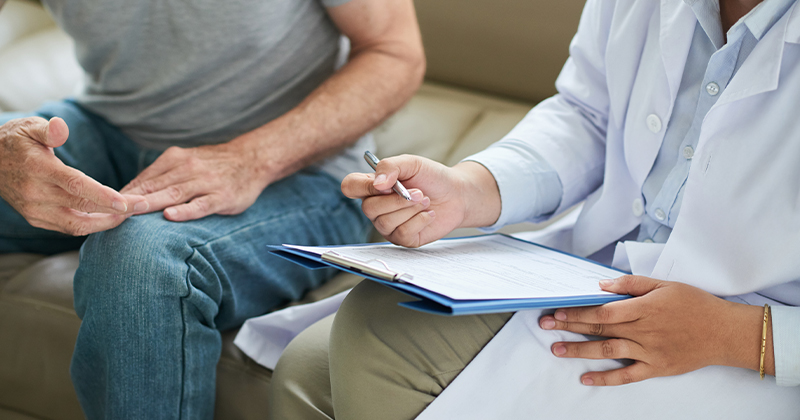Depression Treatment
“Depression is the inability to construct a future.” ― Rollo May, “Love and Will”
Depression can be debilitating. It leaves you feeling like there is no hope for the future. Depression convinces you that these feelings of sadness and isolation will never get better. Even when you know you need to get up and take care of work and household responsibilities, it can be next to impossible.
The Oceans Experience
Oceans is committed to providing quality behavioral health in a safe environment. With our telehealth capabilities we can conduct therapy, education and diagnosis via phone or video. We accept Medicare, TRICARE and most private insurance.
Clinical depression is a very lonely experience. But the condition’s not as rare as you might think. As of 2021, an estimated 21 million American adults had experienced at least one depressive episode. If you or a loved one is living with depression, treatment can help you find a path to recovery that works for you.
With more than 30+ locations throughout the southern United States and beyond, Oceans Healthcare is ready to empower you to begin your recovery.
What We Treat: Substance Use and Mental Health Disorders
Depression is a common mood disorder characterized by persistent low mood and a lack of interest in things that you used to enjoy. It impacts the way you think, feel, and behave.
It is normal to feel grief or sadness when something bad happens. But depression is more than just a passing feeling of sadness or unhappiness. Depression lasts practically every day for two weeks or more.
Without treatment, depression can last for months or even years. In severe cases, depression can lead to thoughts of self-harm or suicide.
People with depression sometimes develop co-occurring substance use disorders. This happens when you try to self-medicate your depression, which leads to psychological and physiological reliance on the substance. While substance use might feel good in the short term, it makes symptoms worse in the long term.
At Oceans Healthcare, we are prepared to treat complex co-occurring depression and SUD. Together, we can get to the root causes of your condition(s). Fortunately, with the right combination of therapy and medication, you can manage your symptoms and live a happy, healthy life.
Every client’s recovery is overseen by a board-certified psychiatrist, and a whole team of clinicians will work together to develop the best treatments to fit your unique needs.

Depression Treatment Options
When it comes to treating depression, we understand that you need different options. Whatever amount of care you need, we are prepared to help you heal.
Residential or Inpatient Services
Residential treatment is a great option if you are living with severe depression. Inpatient services will provide you with 24/7 care from clinical staff. You’ll benefit from a warm, homey environment that promotes healing while you take time away from daily life to focus on getting back to baseline.
We encourage anyone who is experiencing depression and feels unsafe alone or in their home environment to consider a residential stay. Our residential staff will provide you with a safe, structured environment. Daily individual and group therapy sessions will empower you to dig into the underlying thoughts and feelings that contribute to your depression.
Partial Hospitalization Program Services
In our partial hospitalization program (PHP), clients receive four to five hours of therapy and treatment per day. PHP is a good fit for you if you’re looking for rigorous on-location treatment but want to go home in the evenings.
In PHP you will work with clinical professionals to develop tools for dealing with depression. You will also receive medication management services.
Intensive Outpatient Program Services
An Intensive Outpatient Program (IOP) is appropriate for you if you have moderate depression. This program offers more support than traditional outpatient therapy but allows you to otherwise continue your normal day-to-day. In our IOP program, you’ll come to our facilities four evenings a week for approximately 3 hours of treatment.
STAR Military Program
This program is designed with the specific needs of active-duty military members, veterans, and their families in mind. STAR staff are familiar with military life and utilize treatment methods recommended by the U.S. Department of Defense and Veteran Affairs.
We understand that military life has unique requirements. This includes challenges like combat-related post-traumatic stress and long-term separation from family and friends. By tailoring your treatment to those specific needs, we empower you to heal and get back to what matters most.
Understanding the Factors That Lead to Depression
Depression does not discriminate. The condition can affect you at any time in your life. You can develop depression at any time, but some factors put some people at greater risk for developing depression.
How Common is Depression in Adults?
According to data from the National Institute of Mental Health, an estimated 8.3% of adults throughout the U.S. are living with depression, as of 2021. Depression is slightly more common among women than men. An estimated 10.3% of women have experienced a depressive episode, as opposed to just 6.2% of men.
Rates of depression are highest in young adults aged 18-25 years old. Over 18% of individuals in this category reported experiencing at least one depressive episode in 2021.
A 2023 national survey suggests that as many as 29% of adults in the U.S. are estimated to have been diagnosed with depression at some point in their lifetime.

Who Is at Risk for Depression?
Depression can crop up in adulthood, even if you’ve never experienced it before. However, some people have more risk factors than others.
Common risk factors include a family history of depression or other mental illnesses, stressful life events (like a tragic loss or financial burden), adverse childhood experiences (ACEs), chronic health problems, and social isolation.
The causes of depression differ from person to person. Even if you have not experienced any of the risk factors above, you could still develop depression.
What Depression Symptoms to Pay Attention To?
Symptoms of depression can differ a bit depending on the person, circumstances, and the type of depression you have.
Common symptoms of depression include:
- Feelings of deep sadness, hopelessness, and worry
- New anger, irritability, or hostility
- No longer enjoying hobbies or activities you used to enjoy
- Fatigue or low-energy
- Slowed speech or movements
- Difficulty falling asleep or sleeping too much
- Trouble concentrating
- Sudden weight loss or weight gain due to changes in appetite
- Difficulty concentrating, recalling information, or making decisions
In severe cases, depression causes thoughts of self-harm and suicide. Anyone who is thinking about hurting themselves or someone else needs to seek medical attention immediately.
Getting a Depression Diagnosis
To diagnose depression, our team will get a thorough understanding of your medical and mental health history, as well as your current symptoms. You will receive a physical exam and blood tests to ensure that you do not have an underlying health condition that’s causing your depressive symptoms.
You will meet with a board-certified psychiatrist who will determine whether or not your symptoms meet the criteria for clinical depression (or another mental health condition).
To be diagnosed with clinical major depressive disorder, you must experience at least five symptoms of depression nearly every day for two weeks or more. You could also be diagnosed with a different type of depression, like seasonal affective disorder or atypical depression, depending on your symptoms.
How Depression Is Different From Sadness or Grief
It is very normal to feel sad when faced with loss and hardship. Sometimes, it can be difficult to tell the difference between grief and depression.
Typically, grief is acute. It has a direct cause and gets better over time as you process the loss you’ve experienced. Similarly, sadness is an emotion that comes and goes like any other.
Depression, on the other hand, is a persistent mental health condition. One hallmark of depression is low self-esteem. When you’re bereaved or sad about a situation, your self-esteem usually stays intact. When you’re depressed, you’re more likely to constantly blame yourself for hardships. Depression also affects your wider worldview, where sadness or grief is usually focused on a specific experience.
Getting the Best Depression Treatment Today in Dixieland
At Oceans Healthcare, we use six fundamental values to guide every aspect of our treatment practices.
- We uphold dignity by providing a safe and healing environment so that every individual is treated with respect and compassion.
- Our commitment to comprehensive care fosters the mind-body connection, ensuring holistic healing for lasting wellness.
- With a dedication to quality, we constantly pursue improvement, creating a space where trust and growth flourish.
- Rooted in integrity, we maintain transparency and value the trust clients place in us.
- Through our advocacy, we support our clients and their families, extending the healing process beyond our walls.
- With teamwork, we encourage one another to grow, share successes, and face challenges together, always striving to deliver the best care possible.
Living with depression is exhausting, but you’re worth the effort that it takes to recover. And, we’re ready to help you get started with treatment as soon as you’re ready.
Our world-class clinical staff can start working with you on depression treatment today! Oceans Healthcare accepts 24/7 referrals, so we’re ready as soon as you are. Our origins in geriatric care mean that from adolescents to the elderly, we understand the importance of treating the whole person, emphasizing physical and mental health. Call us now at 888-293-6899.
Oceans Healthcare: Your Path, Our Purpose.

